Submitted by WA Contents
Sports pavilion is made of zigzagging brick walls referencing serrated leaves of endangered banksia
Australia Architecture News - Feb 16, 2023 - 16:36 3690 views
Australian architecture practice Sam Crawford Architects has designed a sports pavilion with zigzagging brick walls, referencing serrated leaves of endangered banksia in Queens Park in Sydney’s eastern suburbs, Sydney, Australia.
Named Queens Park Sports Pavilion, the project is situated in Queens Park in Sydney’s eastern suburbs.
The outer skin of the pavilion is inspired by the serrated leaf of the banksia serrata. As SCA explained, a remnant of the once widespread Eastern Suburbs Banksia Scrub can be found near the site.
The project was commissioned by Greater Sydney Parklands to provide new facilities with robust materials and a durable design.
The building sits lightly in the landscape, receding into it through scale, form, material and colour, an aesthetic contribution to the wider Centennial Parklands.
Landscaping screens soften the building’s appearance, enhancing the sense of being embedded in the landscape. And of course more banksia are planted.
"Public and sporting communities now have a functional, safe, accessible and light-filled facility," said Sam Crawford, director of Sam Crawford Architects.
"There are dedicated men’s, women’s and accessible bathrooms and change rooms, umpire facilities and storage spaces."
"We referenced the banksia leaves with zigzagging (or serrated) brick walls to provide connection to the historical and ongoing ecology of Queens Park. One of two remnant and rehabilitation areas of the once widespread Eastern Suburbs Banksia Scrub is opposite the pavilion. The park’s native vegetation was largely cleared by 1930," Crawford added.
In order to reduce the sense of overall mass and add depth to the facade, the studio pinched the building in at both ends.
"These pinched setbacks also create a separate sheltered area for spectators and members of the public at each end, something that was missing in the previous outdated amenities block," according to Crawford.
The studio designed a central covered area in the middle to provide a sheltered meeting/sign in space for sports teams.
Crawford added that "It also breaks down the building’s mass and facilitates an accessible, connected walkway from street to sports fields. Connecting the two frontages, it also allows views through the building from the street to the parklands."
The pavilion features a raised floating skillion roof which is cantilevered upwards towards the fields, while allowing cross views of the park from the street.
To create a durable design, the team used translucent fibreglass and perforated wire mesh over a steel frame form the roof. Thanks to the structure of the roof, the interiors receive a plenty of natural light and provides ventilation to the change rooms and amenities.
An alternating brick pattern of stretcher bond and extruded Flemish bond adds texture and interest, whilst hit and miss brickwork allows connection and natural ventilation.
The building features eco-concrete, timed LED lights, and recycled blackbutt timber benches, as the studio explained. At one end are the public amenities accessed directly via the pedestrian crossing, and the other end is the sports storage.
"We needed to manage the flow of cyclists and walkers with sportspeople and spectators on the shared pathway between the building and sporting fields. So we created a 70-metre long artwork on the pavement that references the colours and form of the banksia, and draws attention to the pedestrian zone," Crawford continued.
"We have designed quite a few sports pavilions and amenities buildings over the years. Each one presents unique challenges particular to site and setting. All have high public usage, so both the design and materiality has to be incredibly robust. In Queens Park, there are teenagers with football boots, parents with prams, and cyclists with bikes, all interacting at this one point."
According to the studio, the goal of the project was to "make a connection between the design and the local context - the people or the landscape, the history or the geography - something that is precious or endangered."
"Highlighting the Eastern Suburbs Banksia Scrub – an endangered ecological community that was once ubiquitous across the sandy stretches of the Eastern Suburbs - is a reference that may not be read by all, and yet the building form is specific to that place and seems to fit naturally within the park," Crawford added.
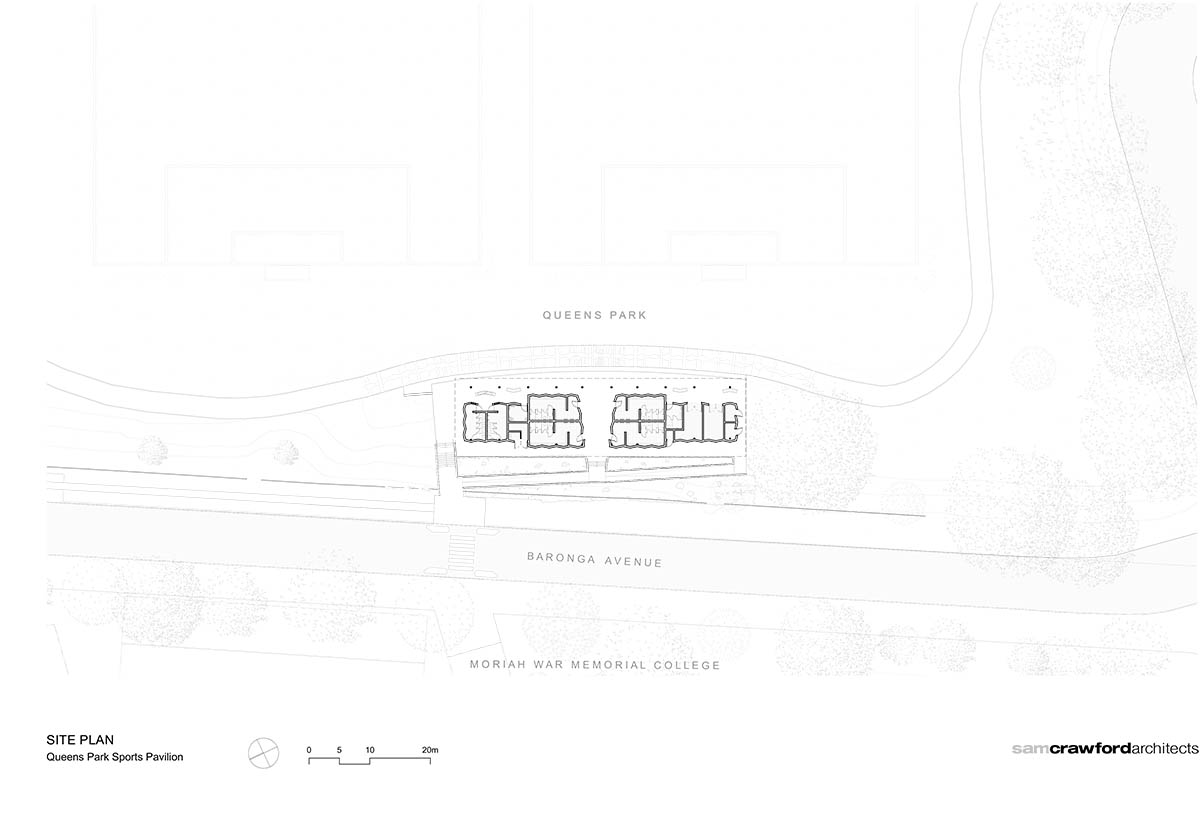
Site plan
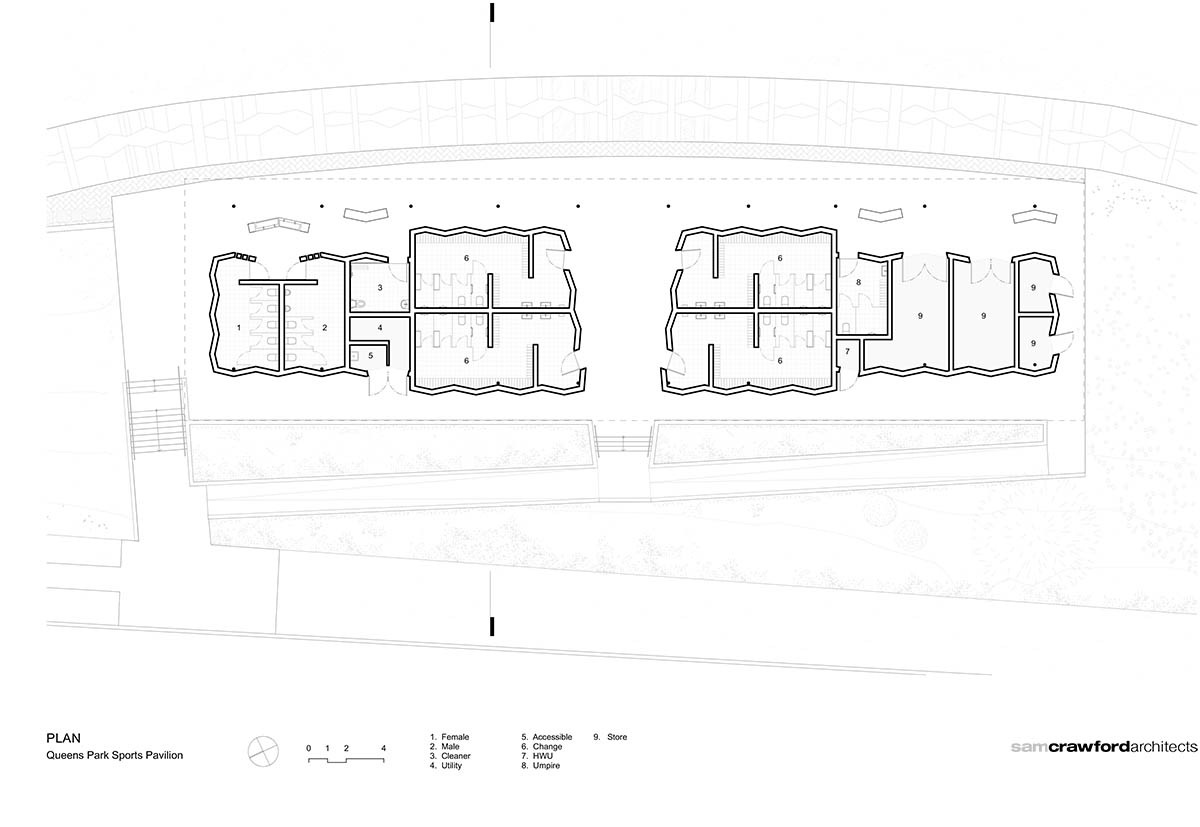
Plan
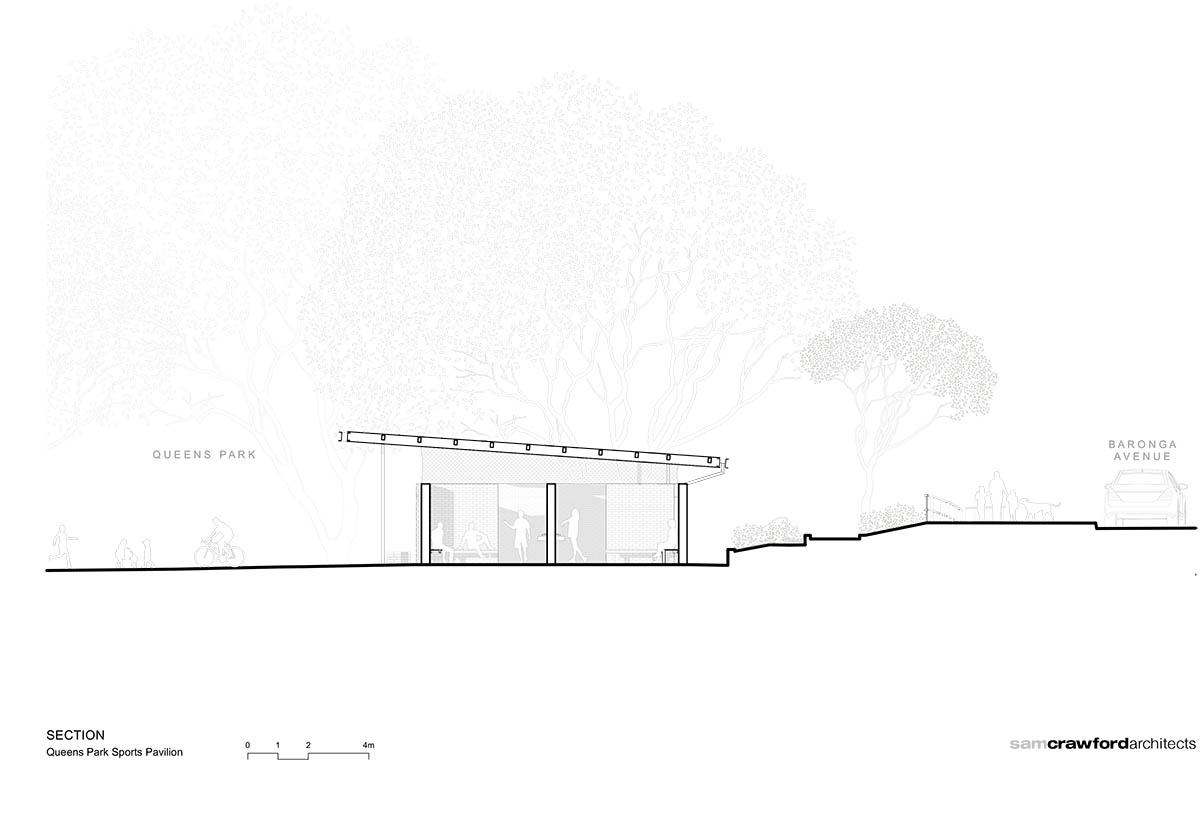
Section
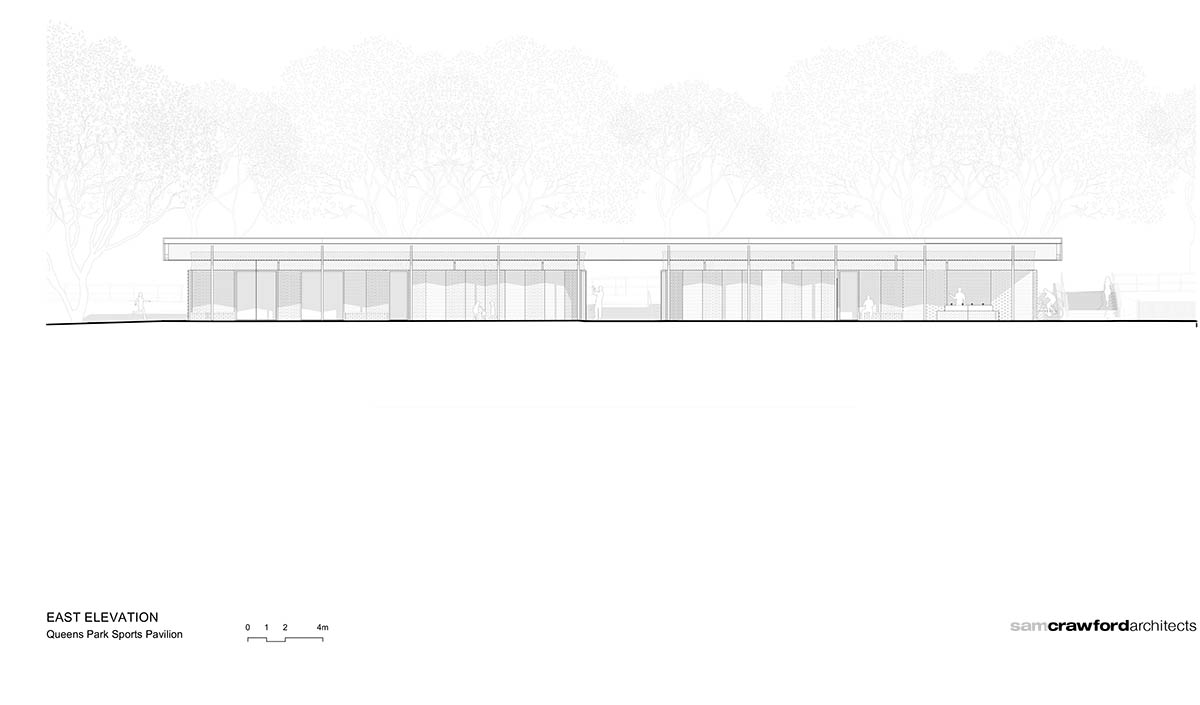
East elevation
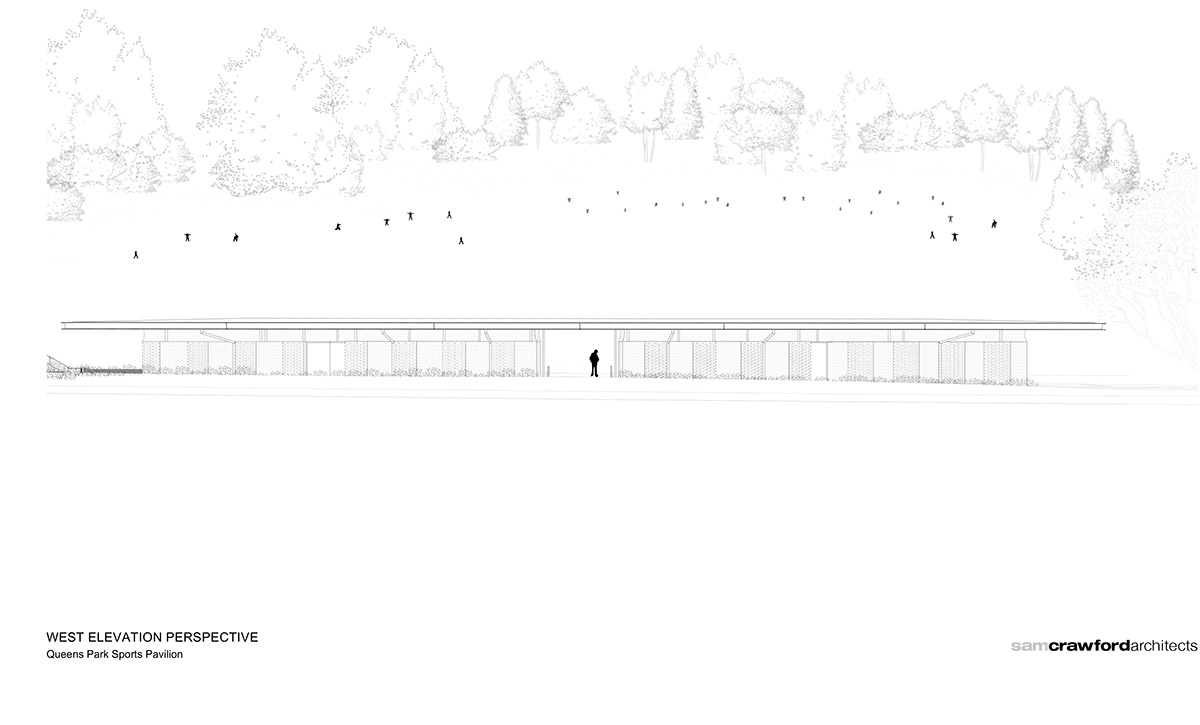
West elevation
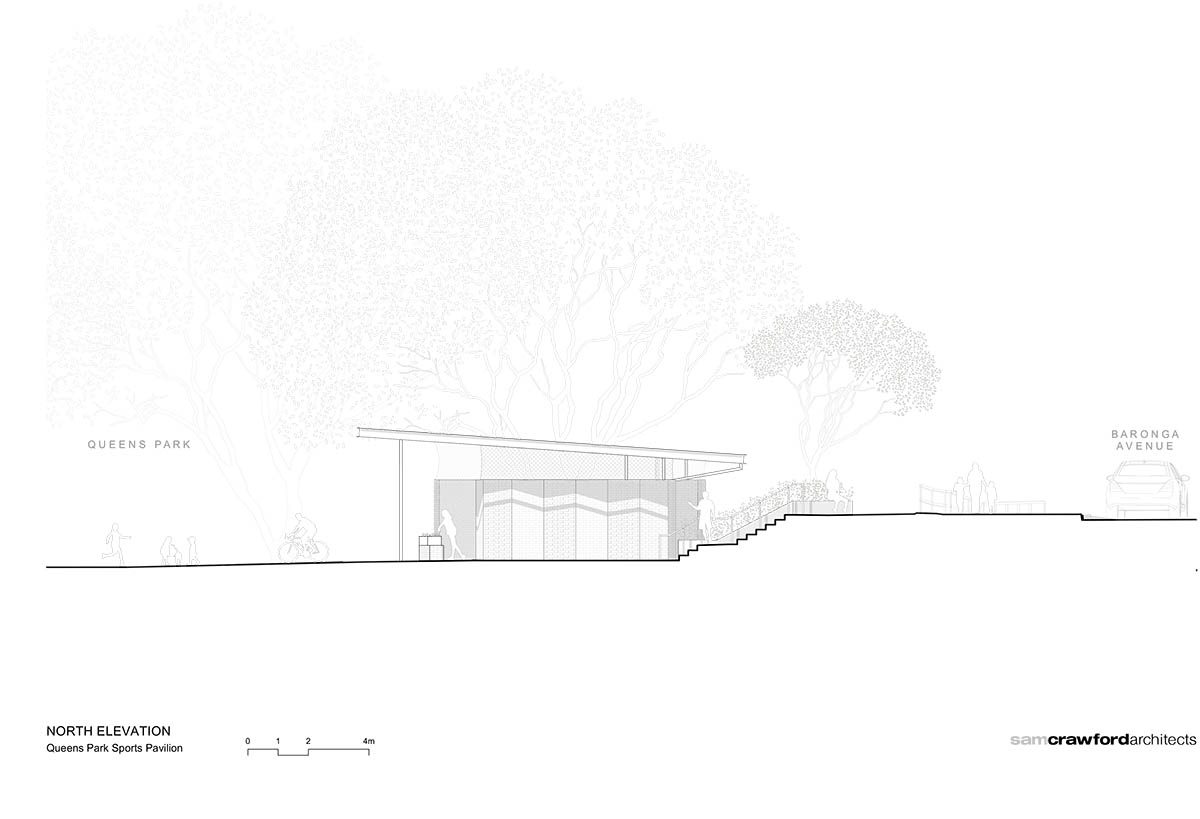
North elevation
The site is located on the land of the Gadi Peoples of the Eora Nation who traditionally occupied the Sydney coast. Queens Park is a significant and historical recreational area and was established in 1888.
SCA is a design-driven architectural practice based in Sydney, Australia. Over the last 20 years, the award-winning practice has established a reputation for design excellence in residential, cultural, public and educational projects.
Project facts
Project name: Queens Park Sports Pavilion
Architects: Sam Crawford Architects
Client: Greater Sydney Parklands
Location: Queens Park, Sydney
Status: Built late 2022
Project Manager: Greater Sydney Parklands
Structural Engineer: ACOR
Hydraulic Engineer: ACOR
Land Surveyor: Veris
Lighting and Electrical Engineer: ACOR
Quantity Surveyor: MBM
Access & BCA: DPC
All images © Brett Boardman.
All drawings © Sam Crawford Architects.
> via Sam Crawford Architects
brick built pavilion Sam Crawford Architects sports pavilion Sydney translucent fibreglass
